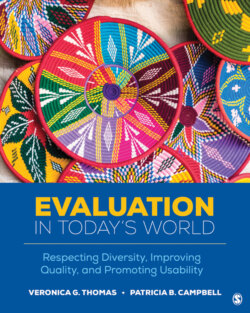Читать книгу Evaluation in Today’s World - Veronica G. Thomas - Страница 47
На сайте Литреса книга снята с продажи.
Introduction
ОглавлениеIt is expected that an evaluator’s work results in an evaluation that is ethical, culturally responsive, and high quality. In reality, achieving these important outcomes is more daunting than it appears on the surface. Due to the idiosyncratic, political, and applied nature of social programming, and subsequently the evaluation of those programs, ethical issues can arise that, if not properly handled, will negatively impact the integrity and quality of the evaluation. While the evaluation profession has written, and publically disclosed, ethical principles and quality standards, these represent only a reference point for guiding the attitudes and behaviors of evaluators. Professional evaluators also need to have a keen awareness and deep understanding of contextual factors that may give rise to the complexity and urgency of dealing with ethical concerns in diverse settings.
Ethics is a branch of philosophy focusing on values relating to human conduct with respect to the “rightness” and “wrongness” of actions. It involves standards for responsible conduct prescribed by an external source (e.g., society, businesses, professional organizations) aimed at guiding individual decision making and behaviors. This is in contrast with morals, which stem from within individuals—that is, individuals’ own personal boundaries and principles of right and wrong. The following activity provides an opportunity for readers to reflect on and discuss ethics from their own perspective.
